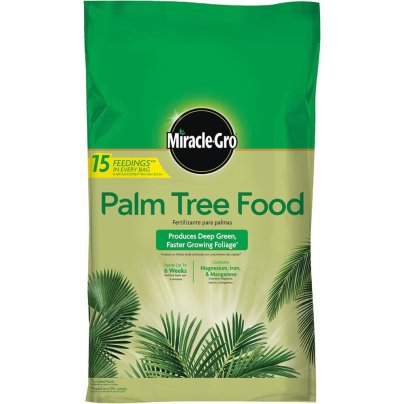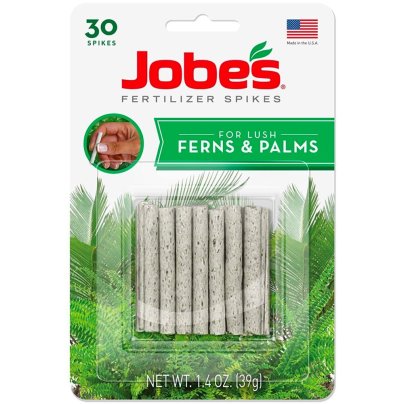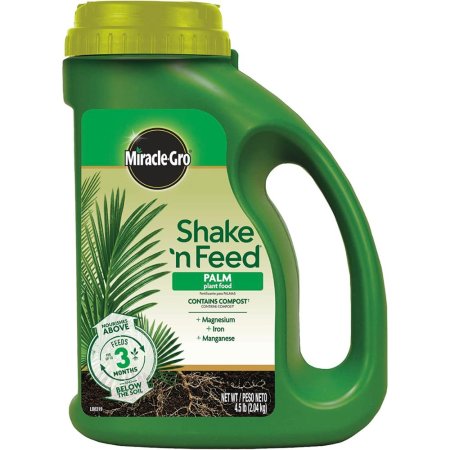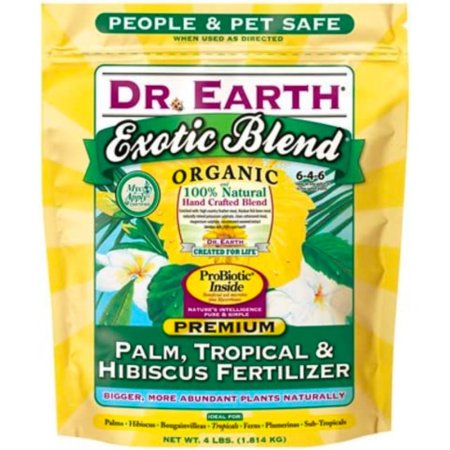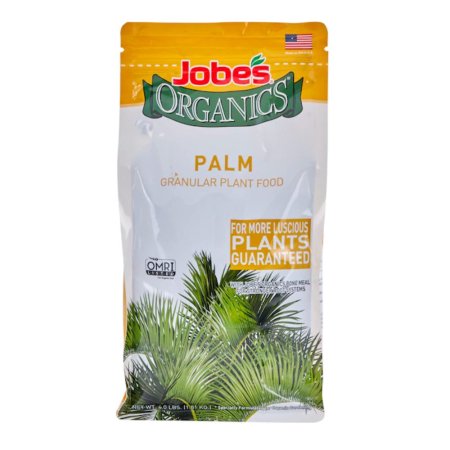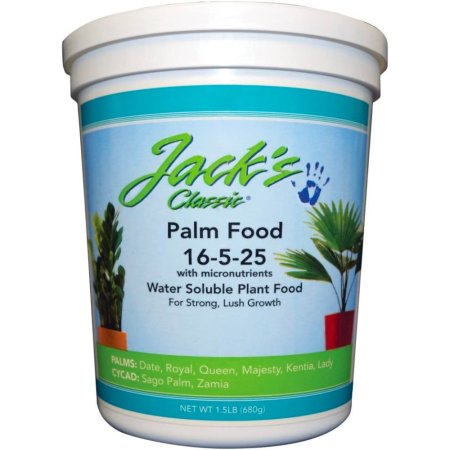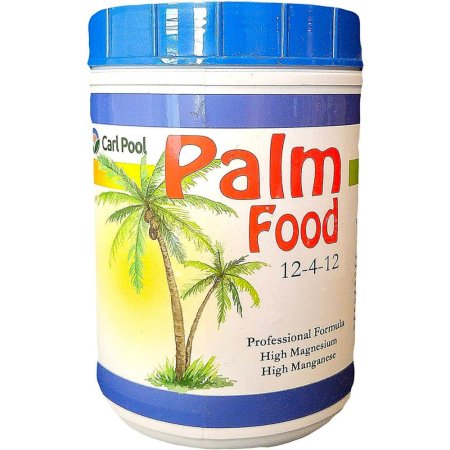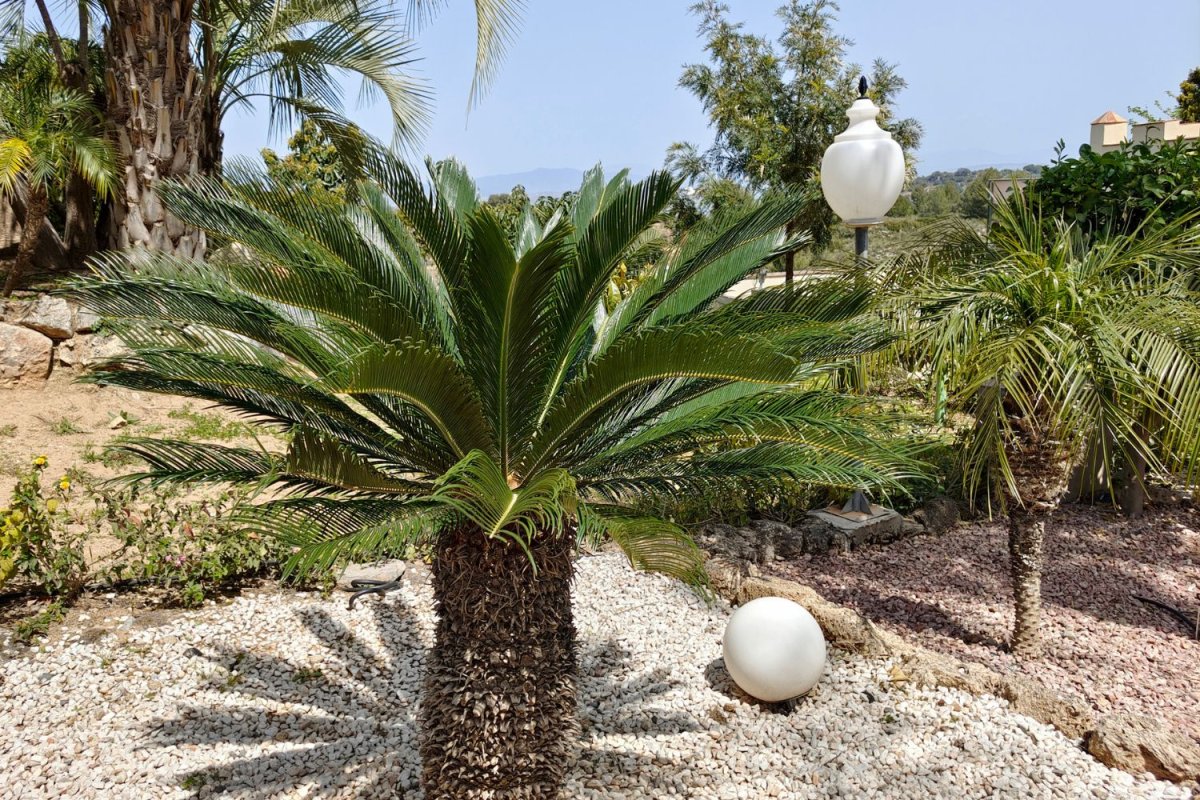
We may earn revenue from the products available on this page and participate in affiliate programs. Learn More ›
Palm trees are notorious for the tropical touch they add to a garden landscape. Though easy to maintain once established, they require adequate sunlight, water, and the proper fertilizer. If these needs aren’t met, a palm tree’s fronds will begin to curl or yellow.
Gardeners can keep fronds lush and green by supplying a fertilizer with a healthy dose of nitrogen and potassium, and a low amount of phosphorus. Palm trees also benefit from micronutrients such as manganese, magnesium, and iron. Our favorite is the Miracle-Gro Shake ’N Feed thanks to its easy to use and long-lasting formula. There are many options to weed through, but we’ve done the work and found some of the best fertilizers for palm trees.
- BEST OVERALL: Miracle-Gro Shake ’N Feed Palm Plant Food
- BEST BANG FOR THE BUCK: Miracle-Gro Palm Tree Food
- BEST SPIKES: Jobe’s Fern and Palm Plant Food Container Spikes
- BEST ORGANIC: Dr. Earth Organic and Natural Exotic Blend
- BEST GRANULATED: Jobe’s Organics Palm Granular Plant Food
- BEST WATER-SOLUBLE: JR Peters Jack’s Classic Palm Food 16-5-25
- HONORABLE MENTION: Carl Pool Palm Food 12-4-12

Product Comparison
| Type | NPK Ratio | Product Size | |
| Miracle-Gro Shake ’N Feed Palm Plant Food | Granular | 8-2-12 | 4.5 pounds |
| Miracle-Gro Palm Tree Food | Granular | 8-4-8 | 20 pounds |
| Jobe’s Fern and Palm Plant Food Container Spikes | Spikes | 16-2-6 | 30 spikes |
| Dr. Earth Organic and Natural Exotic Blend | Dry organic matter | 5-4-6 | 4 pounds |
| Jobe’s Organics Palm Granular Plant Food | Granular | 4-2-4 | 4 pounds |
| JR Peters Jack’s Classic Palm Food 16-5-25 | Water-soluble | 16-5-25 | 1.5 pounds |
| Carl Pool Palm Food 12-4-12 | Granular | 12-4-12 | 4 pounds |
Our Top Picks
What is the best palm tree fertilizer? Let’s look at some of the best food for palm trees. When used as directed, these products will help palm trees thrive.
Best Overall
Miracle-Gro Shake ’N Feed Palm Plant Food
What We Like
- Easy to apply
- Contains the proper micro- and macronutrients
- Reapply as little as every 3 months
- Works for container-grown and in-ground trees
What We Don’t Like
- Overuse can lead to plant burns
Product Specs
- Type: Granular
- NPK ratio: 8-2-12
- Product size: 4.5 pounds
Gardeners looking for a product with the right blend of nutrients in an easy-to-use bottle will appreciate Miracle-Gro Shake ’N Feed Palm Plant Food. It provides an NPK of 8-2-12 with magnesium, manganese, and iron to support fronds so they won’t yellow or curl.
Miracle-Gro Shake ’N Feed comes in a convenient container with a spout. To use the product, shake it around the drip line of the palm tree, lightly work it into the soil, and then water. Gardeners can use this product every 3 months.
This fertilizer works for palms in the ground or container-grown varieties. The only downside is that it can potentially cause plant burns if overused.
Get the Miracle-Gro Shake ’N Feed fertilizer for palm trees at Amazon, Lowe’s or Tractor Supply Co.
Best Bang for the Buck
Miracle-Gro Palm Tree Food
What We Like
- 1 bag provides 15 feedings
- Contains necessary nutrients for a healthy tree and fronds
- Inexpensive
- Easy to use
What We Don’t Like
- Need to apply more frequently compared to other fertilizers
Product Specs
- Type: Granular
- NPK ratio: 8-4-8
- Product size: 20 pounds
While moderately priced palm tree foods are abundant, Miracle-Gro’s Palm Tree Food is especially great for budget-conscious palm tree lovers. This fertilizer delivers approximately 15 feedings to a palm tree. Since it needs reapplication only every 6 weeks, one bag lasts a long time.
The Miracle-Gro Palm Tree Food packs an NPK ratio of 8-4-8 and contains manganese, magnesium, and iron. It’s easy to use: Apply the fertilizer evenly to the soil under the palm’s branches, and lightly work it in the ground.
Get the Miracle-Gro Tree Food fertilizer for palm trees at Lowe’s or Tractor Supply Co.
Best Spikes
Jobe’s Fern and Palm Plant Food Container Spikes
What We Like
- Easy-to-use spikes
- Lasts for 2 months
- Eliminates mess and fertilizer runoff
What We Don’t Like
- Suitable only for container-grown palm trees
Product Specs
- Type: Spikes
- NPK ratio: 16-2-6
- Product size: 30 spikes
Jobe’s Fern and Palm Plant Food Spikes are hard to beat for gardeners with container-grown palm trees. They are easy to use, release nutrients slowly, and have an NPK ratio of 16-2-6.
To use Jobe’s plant food, insert the spikes in the palm tree’s pot between the tree trunk and the edge of the container. The number of spikes inserted depends on the container size, ranging from two to six. Replenish spikes every 2 months.
Jobe’s also makes a fertilizer spike for palm trees planted in the ground. These spikes have a slightly different NPK ratio, are larger, and should be used only twice per year.
Get the Jobe’s fertilizer for palm trees on Amazon.
Best Organic
Dr. Earth Organic and Natural Exotic Blend
What We Like
- Organic and non-GMO
- Contains microbes to improve soil health
- Gentle 5-4-6 formula won’t burn plants
- Easy to apply
What We Don’t Like
- May have a slightly unpleasant smell
Product Specs
- Type: Dry organic matter
- NPK ratio: 5-4-6
- Product size: 4 pounds
Dr. Earth packs a great mix of nutrients and microbes for gardeners who are more interested in organic products. The formula features an NPK ratio of 5-4-6 with sulfur and magnesium. This fertilizer is ideal for palm trees, plumeria, hibiscus, and other tropical plants.
For planted palm trees, apply this fertilizer every 2 months—use ½ to ¾ cups of fertilizer for every foot of tree height. Mix the fertilizer into the ground under the tree’s drip line. Fertilize container-grown palms every 2 months by adding 2 tablespoons of fertilizer for every 6 inches of pot diameter.
Get the Dr. Earth fertilizer for palm trees on Amazon.
Best Granulated
Jobe’s Organics Palm Granular Plant Food
What We Like
- Organic fertilizer with environmentally friendly ingredients
- Gentle NPK won’t burn palm trees
- Easy to use for planted and container-grown palms
- Contains a mix of microorganisms for soil health
What We Don’t Like
- Large trees require a lot of fertilizer
- May have an unpleasant, organic smell
Product Specs
- Type: Granular
- NPK ratio: 4-2-4
- Product size: 4 pounds
Jobe’s Organics Palm Granular Plant Food provides the ideal NPK ratio and can boost soil health. This fertilizer contains Jobe’s Biozome, a unique blend of bacteria, fungi, and archaea, encouraging palm trees to absorb nutrients more quickly. It has an NPK ratio of 4-2-4.
To use this fertilizer, gardeners need to measure their palm tree’s longest frond. For example, a tree with a 2-foot frond will need 1 cup of fertilizer, while a tree with a 6-foot frond will need 11 cups of fertilizer. Gardeners should evenly work the correct amount into the soil under the tree’s canopy. This fertilizer also works for container-grown palm trees.
Get the Jobe’s Organics fertilizer for palm trees at Amazon.
Best Water-Soluble
JR Peters Jack’s Classic Palm Food 16-5-25
What We Like
- Fast delivery of nutrients
- Easy-to-mix powder
- Contains macro- and micronutrients
What We Don’t Like
- Easy to overuse
- Needs to be reapplied every 7 to 10 days
Product Specs
- Type: Water-soluble
- NPK ratio: 16-5-25
- Product size: 1.5 pounds
JR Peters Jack’s Classic Palm Food mixes with water and goes around the palm’s base to deliver nutrients quickly. The NPK of this fertilizer is 16-5-25. It also contains micronutrients such as magnesium and sulfur.
Gardeners can apply Jack’s Classic Palm Food every 7 to 10 days during the growing season. It’s ideal for the following palm varieties: Date, Royal, Queen, Majesty, Kentia, and Lady.
Since this fertilizer is highly concentrated, take care not to overuse it. Using too much product or applying it too often can cause adverse effects such as burnt or yellowing fronds.
Get JR Peters fertilizer for palm trees on Amazon.
Honorable Mention
Carl Pool Palm Food 12-4-12
What We Like
- Contains 7 beneficial micronutrients
- Lasts up to 4 months
- Works for landscaped and container-grown palms
- Simple application
What We Don’t Like
- Can get expensive for fertilizing large palm trees
Product Specs
- Type: Granular
- NPK ratio: 12-4-12
- Product size: 4 pounds
Carl Pool Palm Food 12-4-12 is one of the best fertilizers for palm trees because it’s versatile and long lasting. This granular fertilizer is a slow-release formula, leaching nutrients into the soil for up to 4 months. It contains an NPK of 12-4-12 with seven added micronutrients, including manganese, magnesium, and iron.
Planted palms will need 1 cup of fertilizer per 3 feet of tree, not to exceed 3 cups. Spread the fertilizer across the soil at the tree’s drip line. Potted palms receive amounts based on container size, with doses ranging from a ½ teaspoon to ⅜ cup.
Get the Carl Pool fertilizer for palm trees on Amazon.
Our Verdict
The best fertilizer for palm trees provides the nutrients palms need but meets a gardener’s needs for cost, convenience, and personal preference. Our top pick for the best palm fertilizer is Miracle-Gro Shake ’N Feed fertilizer for palm trees. It’s easy to use; contains the ideal NPK ratio; and contains manganese, magnesium, and iron for healthy palm fronds. Our budget pick, Miracle-Gro Tree Food fertilizer for palm trees, provides one palm tree with an average of 15 feedings and needs to be reapplied only every 6 weeks.
How We Chose the Best Fertilizers for Palm Trees
Palm trees are finicky when they don’t receive proper nutrients, causing their fronds to yellow and curl. We considered their unique nutrient needs and looked for fertilizers with higher ratios of nitrogen and potassium rather than phosphorus. This balance of macronutrients helps a palm tree maintain lush green fronds and supports growth.
Once we found products with the proper macronutrient blend, we looked for micronutrient content, ease of use, and price. Next, we narrowed our choices by searching for the best palm tree food in several categories based on price and type of fertilizer. And since palms can grow in containers or in the ground, we looked for options that work in both scenarios.
What to Consider When Choosing the Best Fertilizer for Palm Trees
Palm trees require a unique blend of macronutrients and micronutrients to thrive. Gardeners can provide these nutrients through granular, water-soluble, or spike fertilizers. These fertilizers deliver nutrients to the soil, which palm trees can absorb through their root system. Here’s what to look for when choosing the best palm fertilizer.
Type
There are a few forms of palm tree fertilizer, with liquid, water-soluble, granular, and spike being the most common. The difference between them is how they’re applied and how long they work.
- Liquid: Liquid fertilizer comes premixed in concentrated or ready-to-pour containers. Users must dilute concentrated liquid fertilizer with water before adding it to the plant’s soil.
- Water-soluble: Water-soluble fertilizers are highly concentrated and come in a fine powder. The powder is added to water to dissolve before use.
- Granular: Granular fertilizers come in hard pellets that gardeners can work into the soil. Granular fertilizer is typically a slow-release type, providing nutrients to the plant for a longer time than liquid or water-soluble products do.
- Spikes: For gardeners who like to “set it and forget it,” spike fertilizer is the way to go. Place these fertilizer sticks in damp soil around the base of the tree to release nutrients slowly into the soil.
NPK Ratio
Like humans and animals, plants need proper nutrition, and each species has its own requirements. The three macronutrients plants need are nitrogen (N), phosphorous (P), and potassium (K), also known as NPK. Nitrogen helps plants and trees grow green, lush foliage. Phosphorus helps establish a root system and encourages bloom growth in flowering varieties, and potassium improves a plant’s overall health.
On a fertilizer package, these nutrients are listed similarly to this: 10-30-10. Each number represents how much of each nutrient the fertilizer contains, always in the same order (nitrogen-phosphorus-potassium). In this example, the fertilizer has 10 percent nitrogen, 30 percent phosphorus, and 10 percent potassium.
The best food for palm trees is a fertilizer that has a low middle, or phosphorus, number. In addition, the best fertilizer for palms will contain potassium levels equal to or greater than its nitrogen levels. Palm trees also benefit from micronutrients such as magnesium, manganese, and iron.
Organic vs. Inorganic
Aside from the form of fertilizer, gardeners can choose between organic and inorganic products. Though both can deliver the same or similar nutrients to a palm, they have distinctive differences.
Organic fertilizers contain natural ingredients such as minerals from plants, rocks, and animals. These fertilizers are easy for a plant to use and can deliver microorganisms to improve soil quality over time. Most organic fertilizers are nontoxic, making them a top pick for gardeners who have kids and pets.
Inorganic (synthetic, man-made) fertilizers also contain some natural ingredients, such as minerals, that are combined with chemicals to create a highly concentrated product. Because of this process, inorganic fertilizers are less expensive and deliver nutrients quickly. However, they do not last long in the soil or improve its health. They also add to pollution of water bodies and are not as eco-friendly as organic fertilizers, so the best palm tree fertilizer option might depend on personal preference.
Tips for Fertilizing Palm Trees
Though palm trees are a relatively low-maintenance plant, they require ample sunlight, water, and the right fertilizer. Palm trees can be planted in the ground or grown in containers. Gardeners who live in areas with colder winters can choose hardy palms that can handle temperatures as low as 10 degrees Fahrenheit or keep their palms in pots, bringing them inside during the winter.
To get the most benefit out of palm tree fertilizer, follow these tips:
- For outdoor palms, fertilize only during the growing season, which is March through October
- Stop fertilizing 2 months before your area’s average frost date
- To prevent potassium deficiencies that can cause fronds to turn yellow, use a fertilizer with potassium equal to or higher than nitrogen.
For indoor palm trees, use a potting soil developed for palms, place your plant in bright light, and water when the soil is dry. After about a month of having the palm indoors, fertilize it following the directions on the product package.
FAQs
Palm trees can be grown anywhere—the key is to pick a suitable variety based on the climate. For example, gardeners who live in areas with cold winters can choose hardy palms, while those who live in warmer regions can grow most types of palm trees. Here are some common palm tree fertilizer questions and their answers to help palm tree growers.
Q. Do palm plants require fertilizers?
Palm trees require fertilizer to keep their fronds from curling and turning yellow. These plants need a low amount of phosphorus compared to the amounts needed for nitrogen and potassium.
Q. Can I use homemade fertilizer for a palm tree?
Many homemade palm tree fertilizer recipes incorporate ingredients such as bone meal, kelp, bat guano, and eggshells. Making your own plant food can provide necessary nutrients if it is customized to a palm tree’s needs.
Q. What kind of fertilizer should I use for palm trees?
Use a fertilizer with low phosphorus and a potassium level equal to or higher than the nitrogen level. Gardeners can choose between granular fertilizer, spikes, and water-soluble powders. If possible, select a fertilizer that also has the key micronutrients of magnesium, manganese, and iron.
Q. How much fertilizer do palm trees need?
The amount of fertilizer a palm needs depends on the tree’s size and the fertilizer type. Slow-release fertilizers can last up to 4 months between applications.
Q. Are coffee grounds good for palm trees?
Coffee grounds increase the soil’s acidity level, which may be beneficial for palms that prefer a higher acidity. However, some palms do better in pH-neutral soil.
Q. Will vinegar kill palm trees?
Vinegar can kill palm trees when repeatedly applied to the root system. Some gardeners use vinegar as a nontoxic way to kill unwanted trees.

